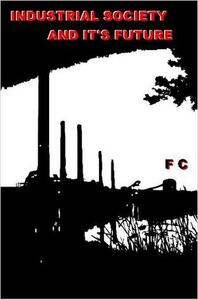Take a photo of a barcode or cover
I think it's an important read, but I will say he is not the best writer. He makes fair points but as he mentions himself a lot of it isn't fleshed out enough. He says himself he doesn't really know what a better world would look like and he honestly doesn't seem to be able to draw any particular picture of it. This man is obviously smart but he quite obviously has also lost touch with his humanity.
challenging
informative
medium-paced
Pretty good overall - one point off for some points I don't agree with, another off for the whole murder thing
informative
reflective
medium-paced
In my view, this book should be considered one of the most influential, significant works of the 21st century — regardless of whether you agree with Kaczynski’s perspective or not. Though it may have been written back in 1995, "Industrial Society and its Future" (ISAIF) remains relevant today — maybe even more relevant now than it has ever been. In this work, Kaczynski points out many of our societal problems, explains their root causes logically, and puts forward solutions that are, simply put, rational.
The key takeaway from this book is probably the “fifth principle,” in the section on “Some Principles of History,” which proposes that people do not consciously choose the structure of their society; instead, external factors like technology largely determine it. This main thesis of sorts first appeared to me, admittedly, rather outlandish at first, but to my surprise, Kaczynski managed to convince me quite quickly.
It's not that uncommon to hear some kind of acknowledgment that "Ted was right about some things," usually just referring to the issues he highlighted rather than the solutions he proposed. Well, I think that your acceptance of the fifth principle tends to show whether you really agree with the author or not. If you take issue with it, you will most likely also take issue with Kaczynski's overarching concept of revolutionary anti-tech thought.
That’s the thing, though — I strongly recommend reading ISAIF yourself and forming your own opinion. It could easily be the defining text of our modern era, where one's outlook on it reveals much about their worldview. While I can't fully capture its depth in a brief review, it's a book everyone should at the very least consider reading.
For me, on a personal level, ISAIF helped me understand my dissatisfactions with our modern society in a way that encouraged positive action rather than self-blame and self-hate. It also gave me an explanation (and solution) for just about every global problem — from the ecological, environmental, and existential, to the humanitarian, political and social.
Furthermore, the author’s words reaffirmed some of my prior opinions that I was less confident in fully articulating. Reading ISAIF was not unlike seeing something written by a smarter “me”; at times, it almost felt like Kaczynski was taking the words right out of my subconscious. It can’t have the same effect for everyone, but it remains a worthwhile work of literature — one which everyone ought to read, at least just once.
From my experience, even those who disagree with the aforementioned “fifth principle” still find value in Kaczynski's manifesto, hence why it is still being analysed and discussed to this day — and I suspect it will stay so for a long time to come.
The key takeaway from this book is probably the “fifth principle,” in the section on “Some Principles of History,” which proposes that people do not consciously choose the structure of their society; instead, external factors like technology largely determine it. This main thesis of sorts first appeared to me, admittedly, rather outlandish at first, but to my surprise, Kaczynski managed to convince me quite quickly.
It's not that uncommon to hear some kind of acknowledgment that "Ted was right about some things," usually just referring to the issues he highlighted rather than the solutions he proposed. Well, I think that your acceptance of the fifth principle tends to show whether you really agree with the author or not. If you take issue with it, you will most likely also take issue with Kaczynski's overarching concept of revolutionary anti-tech thought.
That’s the thing, though — I strongly recommend reading ISAIF yourself and forming your own opinion. It could easily be the defining text of our modern era, where one's outlook on it reveals much about their worldview. While I can't fully capture its depth in a brief review, it's a book everyone should at the very least consider reading.
For me, on a personal level, ISAIF helped me understand my dissatisfactions with our modern society in a way that encouraged positive action rather than self-blame and self-hate. It also gave me an explanation (and solution) for just about every global problem — from the ecological, environmental, and existential, to the humanitarian, political and social.
Furthermore, the author’s words reaffirmed some of my prior opinions that I was less confident in fully articulating. Reading ISAIF was not unlike seeing something written by a smarter “me”; at times, it almost felt like Kaczynski was taking the words right out of my subconscious. It can’t have the same effect for everyone, but it remains a worthwhile work of literature — one which everyone ought to read, at least just once.
From my experience, even those who disagree with the aforementioned “fifth principle” still find value in Kaczynski's manifesto, hence why it is still being analysed and discussed to this day — and I suspect it will stay so for a long time to come.
reflective
fast-paced
clunky prose and a dash of narcissism make it a bit of a struggle to get through but I think it's worthwhile. Also have a look at the little postscript collected in Technological Slavery.
not the text to have a little thought on
not the text to have a little thought on
adventurous
challenging
informative
reflective
fast-paced
adventurous
dark
hopeful
informative
inspiring
reflective
fast-paced
This sober article describes the grim state of the world and the disastrous consequences looming over both the biosphere and the human race that can only be stopped by putting an end to the techno-industrial system once and for all. It is an urgent call to action for a revolution unlike any in history due to its non-political nature and global scope.
The author wastes no words in outlining the psychological type of the so-called 'leftist' to warn the budding anti-tech movement of their subversive tendencies, imploring their total exclusion from any organization against the technological system. Its importance is not understated. In fact, the article begins and ends with words about the leftists. Being a product of its time, relatively little is said about the leftist counterpart, the rightist. However, the thoughtful reader will see that with respect to the underlying source of the problem, they behave identically; they will use all techniques available to centralize power and seek to impose their will on the mass of society.
For anyone that has noticed that the lives of modern humans are devoid of meaning, the exposition of the “Power Process” helps you see exactly why. It describes a basic cycle that humans participate in and how its disruption leads to widespread and persistent dissatisfaction in the lives of even those with "high" standards of living. People are relegated to seeking fulfillment in "surrogate activities" that can never fully emulate the act of taking your life into your own hands and spontaneously, wildly, thriving by your own efforts. From his writings, it becomes clear that humanity and wild nature are nearing total domestication, a state no different than that of a pet dog, of total dependence on artificial systems.
Kaczynski’s answer to those with an optimistic vigor for pushing through and embracing the tendrils of the technical apparatus, in hopes that our problems will be solved with more tech, is that this path would spell our doom, whether by extinction or our transformation into something that is inhuman and machine-like. Moreover, he argues that reformist victories in favor of human freedom tend to be washed away with the rising tide of technological slavery. He explains that this inability to reform the system in favor of humanity, let alone nature, stems from the fact that the technological system and freedom are fundamentally incompatible.
The stated goal, the overthrow of the technological and economic basis of the world, is, no doubt, ambitious. Kaczynski is well aware that this would take a herculean feat on the part of a minority of the population. He does not leave the reader stranded as many who diagnose the source of malaise often do. He takes our dreadful circumstances and manages to invigorate the reader with steps to practical action, should you be convinced of his argument. The Greek myth of Hercules does not show a victorious hero who wildly swung at the Hydra, but a sound mind and heavy hand that cauterized the heads of the beast in flames.



